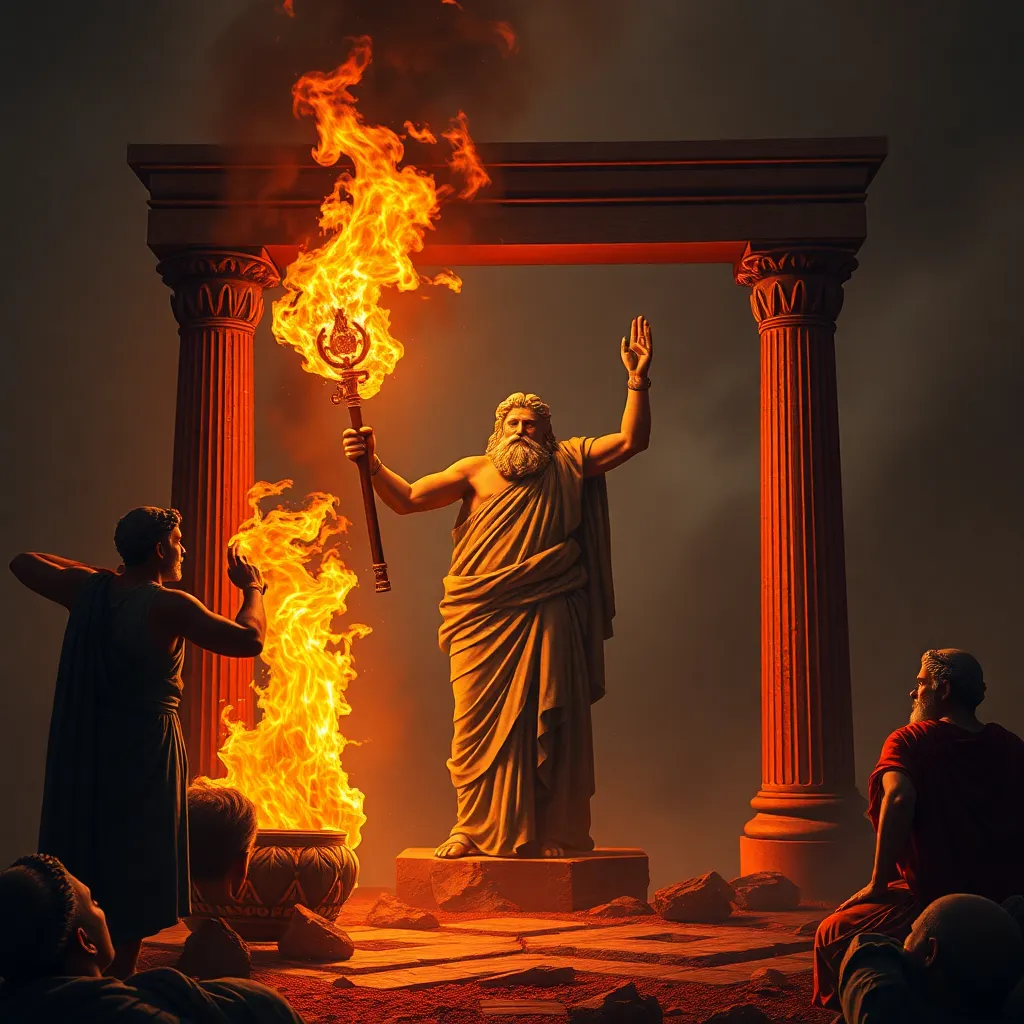Hephaestus and the Role of Fire in Greek Rituals
I. Introduction
In the pantheon of Greek mythology, Hephaestus stands out as the god of fire, metalworking, and craftsmanship. His significance extends beyond mere creation; he embodies the transformative power of fire, which was integral to ancient Greek culture. Fire was not only a tool for survival but also a vital element in rituals and ceremonies that connected mortals with the divine. This article delves into the life of Hephaestus and the multifaceted role of fire in Greek rituals, exploring its importance in both myth and practice.
II. The Mythological Background of Hephaestus
Hephaestus, often depicted as a bearded figure with a hammer and anvil, is the son of Zeus and Hera, although some myths suggest he might be the child of Hera alone. He was born with a physical deformity that led to his rejection by both parents, which shaped his character and destiny.
- Birth and Characteristics: Hephaestus was born lame, a fact that prompted his abandonment. However, he eventually found his place among the Olympian gods as the divine craftsman.
- Role Among Olympians: Despite his initial rejection, Hephaestus became integral to the gods, crafting their weapons and tools, including Zeus’s thunderbolts and Achilles’ shield.
- Symbolism: Hephaestus represents creativity, resilience, and the ability to transform adversity into artistry.
III. The Element of Fire in Ancient Greece
Fire held a dual significance in ancient Greece, seen both as a giver of life and a potential source of destruction. It was a fundamental element that shaped their understanding of the world.
- Source of Life and Destruction: Fire was essential for cooking, warmth, and protection, yet uncontrolled fire could lead to devastation.
- Cultural Perceptions: The Greeks viewed fire as a divine gift but also feared its destructive capabilities, leading to a complex relationship with this elemental force.
- Dual Nature: Fire could create and sustain life, but it could also bring about chaos and ruin, a reflection of the gods’ capriciousness.
IV. Hephaestus as the God of Fire and Craftsmanship
Hephaestus’s connection to fire is profound, as he embodies the creative and destructive powers associated with it.
- Connection to Fire: As the god of fire, Hephaestus wielded the creative force of flames, using them to forge metal into beautiful artifacts.
- Contributions to Technology: He is credited with numerous inventions that advanced technology and craftsmanship, including the first automated devices and tools for agriculture.
- Artistic Representations: In art, Hephaestus is often depicted in his workshop, surrounded by flames and hammers, symbolizing his mastery over fire and metal.
V. Fire in Greek Rituals and Sacrifices
Fire played a central role in Greek religious practices, serving as a conduit between mortals and the divine.
- Role in Ceremonies: Fire was used in sacrifices to the gods, representing purification and devotion.
- Types of Rituals: Common rituals included offerings where animals were sacrificed, with their blood and fat burned on altars, as well as festivals celebrating the harvest and other significant events.
- Significance of Purification: Fire was believed to cleanse both the physical and spiritual realms, making it crucial for rituals seeking protection and favor from the gods.
VI. The Festivals of Hephaestus
Several festivals honored Hephaestus, emphasizing his importance in Greek culture and religion.
- Overview of Festivals: One notable festival was the Hephaestia, celebrated in Athens, which included various athletic competitions and artistic displays.
- Ritual Practices: These festivals often involved processions, offerings, and communal feasts, reflecting gratitude and reverence towards the god.
- Role of Fire: Fire was central to these celebrations, symbolizing Hephaestus’s creative power and the community’s connection to the divine.
VII. Fire’s Symbolism in Greek Mythology and Religion
Fire is a potent symbol in Greek mythology, representing communication with the divine and the transformative nature of the gods.
- Medium for Communication: Fire was often seen as a means to convey prayers and messages to the gods, with smoke ascending as a symbol of connection.
- Myths Involving Fire: Stories such as that of Prometheus, who stole fire from the gods to give to humanity, highlight the significance of fire as a life-giving force.
- Enduring Legacy: The symbolism of fire has persisted, influencing various cultural practices and beliefs throughout history.
VIII. Conclusion
Hephaestus’s significance as the god of fire and craftsmanship is deeply intertwined with the role of fire in Greek rituals. From its practical applications in daily life to its spiritual connotations in religious practices, fire represents the dual nature of creation and destruction. Understanding these ancient practices offers valuable insights into the beliefs and values of Greek society. The themes of creativity, resilience, and the interplay between life and destruction remain relevant today, reminding us of the enduring power of fire in both our lives and our cultural narratives.




